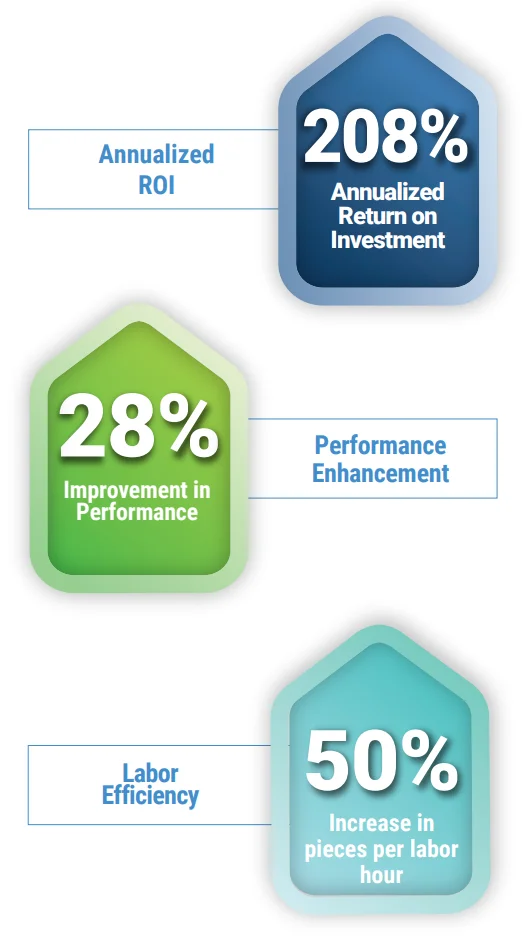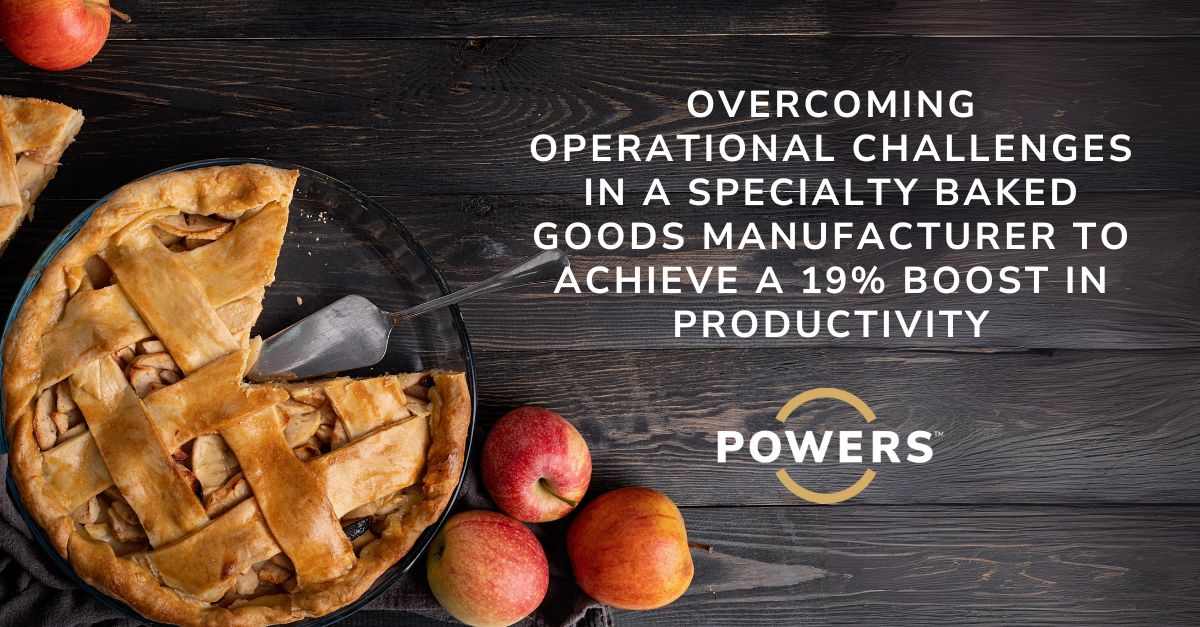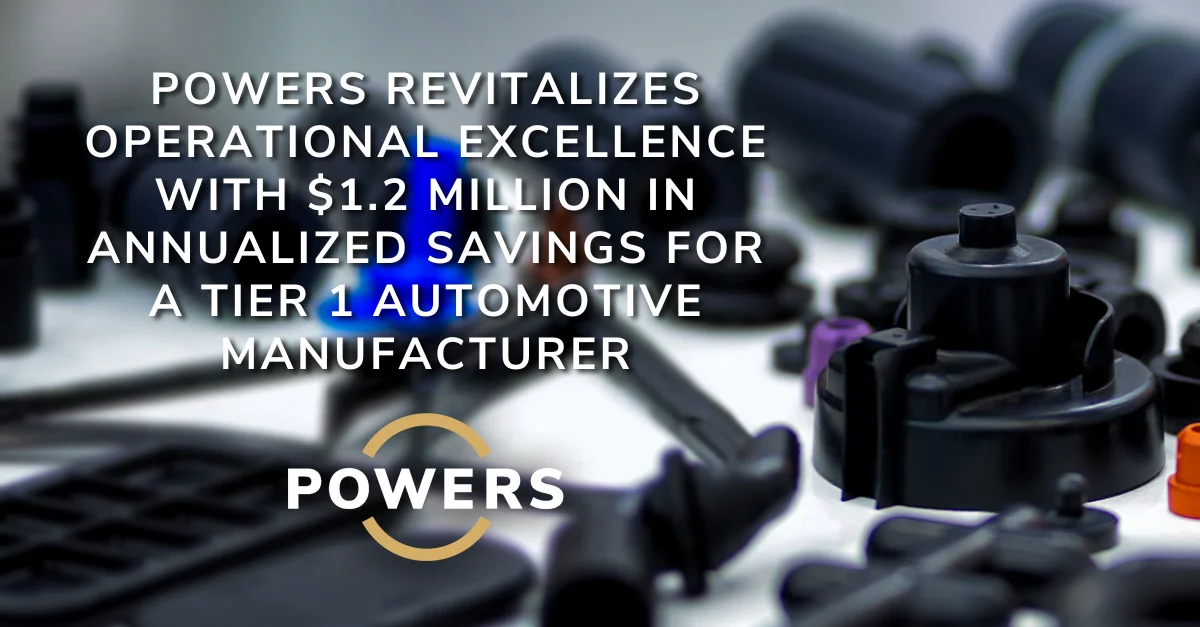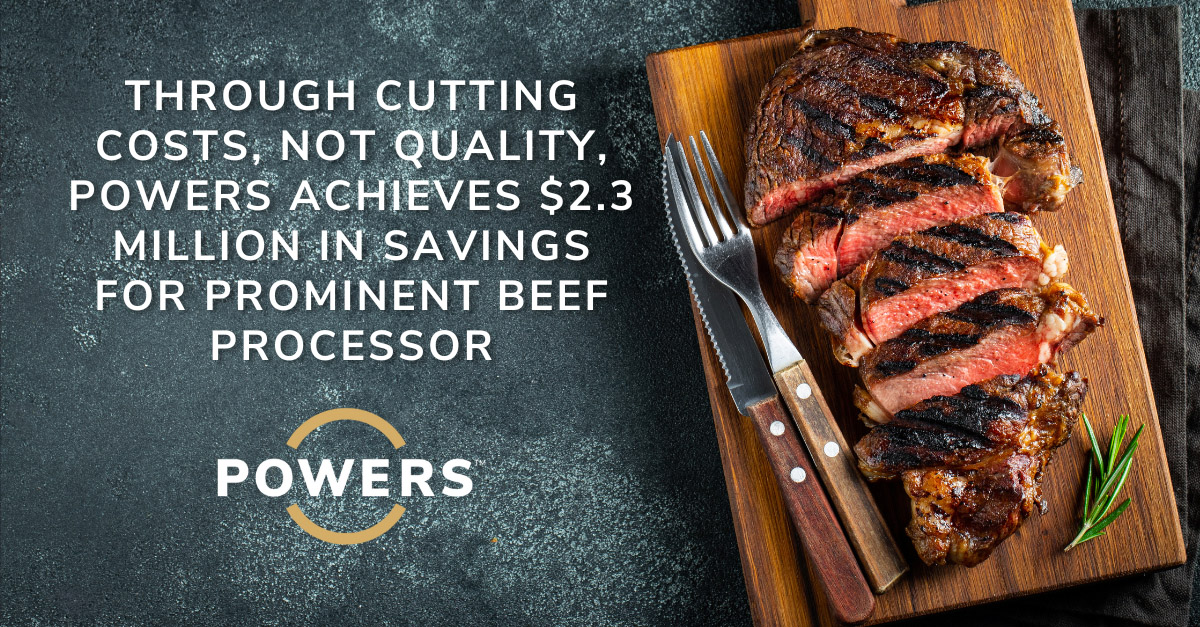

Project Overview

Performance Results
Overview
A distinguished player in the food manufacturing industry embarked on a transformative journey to implement and sustain a Management Operating System (MOS) centered around its automated bakery system. The primary objectives were to supply pie shells to their current facility and reduce purchasing costs. However, the company faced multifaceted challenges, including low production throughput, high employee turnover, and a prevailing culture of complacency with the existing operational status quo. This case study unveils the comprehensive efforts undertaken by a prominent food manufacturer in collaboration with POWERS to address these challenges and achieve significant operational enhancements.
Situation:
The central focus of this food manufacturer’s endeavor was to enhance the performance of its automated bakery system, responsible for producing pie shells for their current facility as well as external customers. The client identified two primary objectives: to ensure a consistent supply of pie shells and to reduce purchasing costs. In their pursuit of operational excellence, the food manufacturer confronted several pressing challenges:
1. Low Throughput: The client’s cook room struggled with a subpar production output, resulting in a daily batch production volume that fell short of optimal levels.
2. High Employee Turnover: The company grappled with a significant issue of employee turnover, impacting not only workforce stability but also incurring substantial training costs.

3. Reactive Supervisory Approach: Within the organizational culture, a prevailing sense of contentment with the status quo had normalized a reactive supervisory approach on the factory floor. This approach hindered the ability to proactively address operational challenges and enhance performance.
Recognizing the critical need for operational improvement, this manufacturing giant sought the expertise of POWERS, a renowned consultancy specializing in driving operational excellence. The partnership aimed to revamp existing practices, boost operational efficiency, and establish a culture of continuous improvement.
Comprehensive Analysis:
POWERS conducted an extensive assessment of the company's operations and identified critical issues that were impeding progress
- Lack of Performance Tracking: The company had not established an effective performance tracking system. As a result, there was limited visibility into operational efficiency, making it challenging to measure progress and identify areas for improvement.
- Absence of Clear KPIs: The absence of clearly defined Key Performance Indicators (KPIs) on the factory floor, including critical metrics such as Schedule Attainment, Plan to Capacity, Throughput, and Efficiency, hindered the ability to set performance goals and measure success.
- Inefficient MOS: The Management Operating System (MOS) in place was lacking and underutilized, with 75% of its elements either missing or not optimally leveraged.
- Production Delays: The cook room and pack room started on time only 59% of the time, resulting in missed efficiency and schedule attainment potential.
- Machine Downtime: A significant 47% of the time, machines stopped working due to non-mechanical issues, leading to production interruptions and reduced output.
The culmination of these issues underscored the urgent need for comprehensive changes and a strategic approach to overcome operational challenges.
The Transformative Plan:
POWERS devised a 12-week sprint plan to guide this food manufacturer through a journey of transformation. The chosen plan was based on a deep understanding of the root causes of the company's operational impediments and a careful consideration of the steps required to surmount these challenges effectively.
The plan encompassed a multifaceted approach:
1. Leadership Development:
- Empowering Leaders for Sustainable Change: Leadership within any organization is pivotal, so empowering Supervisors and Managers in the cook and pack was a crucial component of the plan. POWERS recognized that effective leadership is central to driving operational excellence, and it was vital to equip these key personnel with the skills and knowledge necessary to lead with agility and efficiency.
- Addressing the Human Element: High employee turnover and a prevailing reactive culture indicated that the human element in the operational process needed attention. Empowered leaders play a key in fostering a culture of excellence and motivating their teams to achieve higher standards. By enhancing leadership skills, POWERS and the food manufacturer aimed to create a workforce that could proactively respond to challenges and drive continuous improvement.
2. MOS Enhancement:
- Aligning Operations with Data-Driven Decision-Making: The revamping of the existing Management Operating System (MOS) was a strategic choice driven by the need to align operations with data-driven decision-making. POWERS identified that the client lacked a structured and data-backed approach to managing its operations, which impeded its ability to measure progress, identify areas of improvement, and make informed decisions.
- Hourly Performance Monitoring: The incorporation of hourly performance monitoring within the MOS was an essential step to enhance the visibility of operational efficiency. This level of granularity allowed the client to track their performance in real-time, enabling them to make timely adjustments to address any deviations from the plan.
- Attainment Tracking: Setting performance goals is one thing, but tracking progress towards those goals is another. Attainment tracking ensured that the company had a clear view of how well they were performing in relation to their objectives. This component of the plan enabled the company to make mid-course corrections, ensuring that they stayed on the path towards operational excellence.
- Data-Driven Decision-Making: In today's competitive landscape, data is a valuable asset. By incorporating data-driven decision-making into the MOS, the manufacturer gained the ability to make more informed and strategic choices, enabling them to base decisions on empirical evidence and reducing the reliance on intuition or tradition, which can often be a hindrance to progress.
3. Performance Goals:
- Setting Clear Objectives: The decision to set specific performance goals was a deliberate choice aimed at providing the organization with clear targets to work towards. By specifying the objective of increasing daily batch production in the cook room from 25 batches to over 40 batches per day, the company established a clear and measurable target to drive their efforts.
- Enhancing Operational Efficiency: Performance goals not only provided direction but also focused on the overarching theme of enhancing operational efficiency. By concentrating efforts on the efficiency of the pack room, the company acknowledged that improvements needed to be comprehensive, covering all aspects of their production process.
- Motivating and Mobilizing the Workforce: Having performance goals in place had the additional benefit of motivating and mobilizing the workforce. Clear objectives gave employees a sense of purpose and a shared vision, which, in turn, fostered a more dedicated and committed workforce.
- Measurable Success: These performance goals were not merely arbitrary numbers but were selected based on the potential for substantial improvement. They provided a benchmark against which the success of the transformation efforts could be quantified.
The Results:
For this food manufacturing company, which once grappled with operational challenges, the path forward is now characterized by increased efficiency, enduring success, and an unwavering commitment to the continuous pursuit of improvement within the food manufacturing industry.
The 12-week sprint led to remarkable results for the Client:
- 208% Annualized ROI: The financial impact of the collaboration with POWERS is evident in the exceptional 208% Annualized Return on Investment (ROI), showcasing the substantial returns generated by the implemented improvements.
- Management Operating System: POWERS successfully implemented a robust management operating system in the designated cook and pack room, aligning operations with the company's overarching goals and objectives.
- Filling Yield Improvement: The Filling Yield improved from 75% at the project's inception to an impressive 89%, marking an 18% increase in performance.
- Mix Performance Enhancement: Mix Performance witnessed a substantial rise, increasing from 53% to 68%, reflecting an impressive 28% improvement.
- Pack Performance Uplift: The Pack Performance showed substantial growth, moving from 53% to 65%, an improvement of 22%.
- Labor Efficiency: Pieces per labor hour witnessed a notable increase of 50%, rising from 17.2 to 25.8.
The collaboration with POWERS marked a pivotal moment in the client's operational journey, resulting in a sweeping transformation. This transformation heralded heightened operational efficiency, reduced costs, and a noteworthy enhancement in product quality within their pie shell manufacturing process. This case study stands as a testament to the significant value of implementing a robust Management Operating System and making investments in leadership development as a means to not only achieve but also sustain operational excellence.
Click here to download a PDF copy
Save it to read later, or share with a colleague










